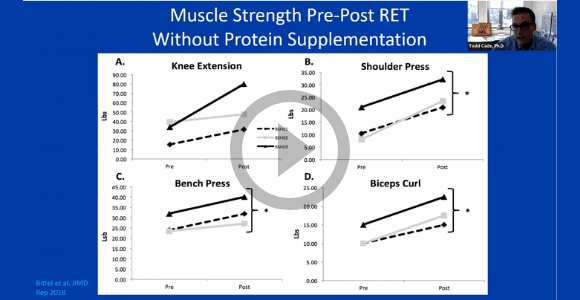
Fatigue and endurance remain critical challenges for our community of affected individuals. On September 24, 2021, Dr. Todd Cade (Duke U.) joined us for a conversation on the role and impact of resistance training in ameliorating these issues. We invited study participants as well as affected individuals that have engaged in resistance training resources and efforts to discuss their firsthand experience with this therapy.
The study was designed to explore exercise as a method to look at physiology as well as change physiology in individuals with Barth syndrome. The team first started looking at aerobic exercise training where participants rode a stationary bike three times per week up to 45 minutes. The participants’ quality of life did not improve after aerobic exercise training, so they moved to resistance training.
Resistance exercise training (RET) targets type 2 muscle and working those muscle groups may improve quality of life. RET includes exercises like chest press, bicep curls, leg press, and triceps pull downs. The purpose of RET study is outlined as:
- Determine if RET is safe/feasible in affected individuals
- Characterize changes in muscle strength and performance, body composition, exercise capacity, and quality pf life following 12 weeks of RET
- Determine if protein supplementation improves the benefits of RET
From the study we learned that:
- Affected individuals have lower lean tissue volume and bone mineral density and higher fat volume compared to controls.
- Muscle mass responses increased as a result of RET both with and without protein supplements, although the gains were slightly higher with the protein supplements.
- There was a significant improvement in the quality-of-life scores for RET plus protein supplements compared to RET alone.
- Additional findings include:
Modest improvements in exercise tolerance in both groups
- No change in heart function of either group
- No evidence of kidney issues with protein supplementation
- No change in absolute neutrophil count in either group
- Protein supplementation increased plasma glutamate levels but no other amino acids
- No significant complaints about taking supplemental protein
To watch the full roundtable, including the question and answer period, click here



